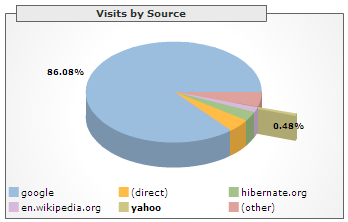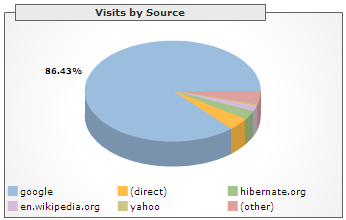
I’m sure that I’m an extreme case; but if Google forgets that I exist, then I’m going to drop off the face of the internet.

I’m sure that I’m an extreme case; but if Google forgets that I exist, then I’m going to drop off the face of the internet.

Perhaps my readers prefer Google. Or perhaps Yahoo hasn’t recognized my existence. But I know that Yahoo isn’t sending many readers my way.
20 Dec: James Robertson experiences a similar trend.
20 Dec: 180 Google to Yahoo Ratio
Rogers Cadenhead is taking on MGM in a dispute over wargames.com. Rogers purchased Wargames.Com with the intention of building a commercial site for the sale of military wargames.
I was playing wargames from Avalon Hill and SPI long before Matthew Broderick appeared on the big screen. I’d hate to see a big bully prevail based upon their so-called trademark.
Rogers will be covering his legal saga on his weblog. I’m eagerly awaiting information on how to protect a domain name from a name grabber.
Everyone is in agreement that last night’s Brawl at the Garden was a disgrace. I don’t need to add any fuel to the fire.
What perplexes me is the sentiment that the baby-blue mafia was responsible for the entire affair. According to this theory, George Karl is responsible for the brawl because he left the starters in to run up the score in retaliation for the way Larry Brown was treated by the Knicks.
Contrast that with common reactions to the Connecticut 50 Point Suspension Rule:
And yet another example of “everyones a winner” mentality infecting sports and rewarding mediocrity.
This rule is just wrong, this rule is liberalism run amok.
How is it acceptable for high school football teams to run up the score while unacceptable for professionals to do the same? The Knicks are highly paid professionals. If they don’t like being down by 20 points, then they should play up to the level of their salaries and keep the game close.
When I joined MyBlogLog back in August, I was interested in real time statistics rather than community. I thought that the widgets were just a gimmick.
But recently, LinkedIn helped me reconnect with an old colleague and pick up some product knowledge for work. And Fred Wilson posted on the growth of MyBlogLog.
I never really bought into the social networking phenomenon. But I never really gave it a chance either. So I have added the MyBlogLog Recent Readers widget, and we’ll see how things go from here.
I forgot the lesson of my first post:
1 | 1 >> 0 |
I was trying too hard and Take the First Step became a chore rather than a release.
I underestimated how much my job as product manager was going to cramp my style. It was easy for technical issues to inspire a nice, safe post. Product issues aren’t nearly as safe.
So much for my excuses. It’s time to resuscitate Take the First Step. Starting now.
I signed up for a year of Carbonite Online Backup. It isn’t my ideal laptop backup solution, but it seems to be better than any of my alternatives.
Pros:
Cons:
There are two types of computer users in the world - those who backup their data and those who wish they had.
I’d like to think that I belong to the first group rather than the second. But that may be wishful thinking on my part - my ultimate work product is kept in Subversion respositories, but all of the intermediaries only get backed up once a week. And the home laptops only get backed up every month or so.
One of my colleagues at work had a hard drive crash. After hearing that we spent close to two grand on hard disk recovery I thought that I take another look at my backup procedure.
The problem with a laptop is that there isn’t a good way to backup - no second internal drive and usually not connected to a network drive for an automated overnight backup. So the work laptop gets a weekly backup and the home laptops get a backup when I get around to attaching an external USB drive.
Which is why I’m currently about 2 GB into a Carbonite Online Backup trial. Carbonite allows me to securely mirror designated portions of my hard drive to their servers. If it works as advertised, then I’ll have access to a one day old snapshot of my system. Easily worth the $50 annual fee. And if it doesn’t work, then I’ll be posting about one of their competitors in a couple of weeks.
__
3 Dec: Online Backup Redux
The greater your risk, the greater your reward. If you ever find yourself assuming greater risk without a corresponding increase in potential reward, then it’s time to re-evaluate what you’re doing.
It is never easy to start a new business. But there is a significant difference between trying to replicate an existing business and trying to create a new market.
Suppose you want to start a new restaurant. You could open a new McDonald’s franchise. You could open a diner serving standard food. Or you could open a new place serving cuisine unfamiliar to the local population.
The McDonald’s is the lowest risk option. In addition, it will likely take the greatest up-front investment. Starting a new diner will be a higher risk, but it will take a much smaller up-front investment. And being the first restaurant with a new cuisine is the highest risk.
Erik Sink advises that you pick your business so that you can compete against the big and dumb. And that is great advice to optimize your chance for success. But because it is an established market, it has the side effect of limiting your upside as well. You can still become comfortable and successful. But you’re not going to be sinfully rich and famous.
If you want a chance to be seriously rich, then you don’t have the luxury of mitigating your risk. You need to go for broke and attempt to build a new market. You don’t get on the cover of Time for competing with the big and dumb.
Personally, I’d be happy with comfortable and successful. But a VC won’t even listen to a business case that makes the founders comfortable and successful.
Conflicting positions aren’t always in conflict. Consider Paul Graham and Mike Taber.
Have you ever noticed how few successful startups were founded by just one person? Even companies you think of as having one founder, like Oracle, usually turn out to have more.
for Paul to say “Starting a startup is too hard for one person.” is incorrect and misleading. I’m doing it now. … Having been in the situation before, I’d prefer to have no partner and have to do all of the work than have a partner who isn’t pulling his weight.
Personally, I just wonder if they aren’t using different definitions of startup. I suspect that Paul Graham thinks of startups as companies that either create new markets or revolutionalize existing markets. As do I. And I suspect that Mike Taber takes a more literal definition of the startup as a new company.
You may disagree, but I find it difficult to see a company as a startup when it simply replicates an existing business. Other than the product, what is the difference between starting a computer game company and starting a restaurant? And why would you consider only one a startup.